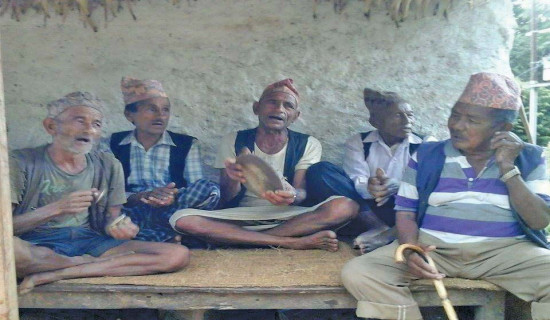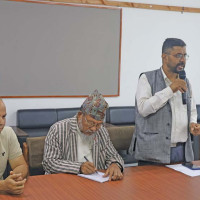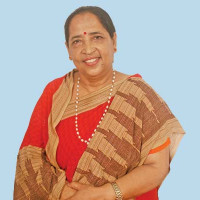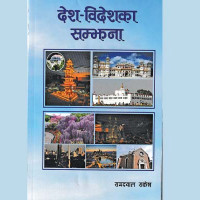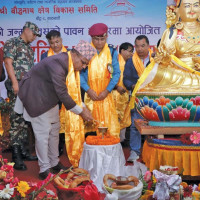- Thursday, 7 August 2025
Once the harbinger of Holi, Mithila’s Jogira now struggling for survival
By Mahesh Kumar Das,Jaleshwor, Mar. 3:
Kae Hathke Dhoti Pahirai, Kae Hath Lapeta
Kae Dharke Pani Piya, Kae Baapke Beta
Jogira Sa Ra Ra Ra, Jogira Sa Ra Ra Ra
Hey Damphake Chot Mahal Bich Phuche
Sutali Goriya Chahaki Uthay Ehi Phagunme
Pardeshiyake Chitthi Likhaie Goriya Ehi Phagunme
Jogira Sa Ra Ra Ra
Kaun Taalpar Dholak Baje, Kaun Taal Mridang
Kaun Taalpar Goriya Naache, Kaun Taalpar Hum
Jogira Sa Ra Ra Ra
Up until a decade ago, entire villages could be heard singing this Maithili song to celebrate the arrival of Holi. “The excitement was such that people across Mahottari and Mithilanchal would begin singing this song from a month before Phaguwa (Holi),” recalled Krishna Chandra Jha, a senior citizen in Suga, Jaleshwar Municipality–4. “But that is just
a memory now.”
When a person or a group of people in a village would begin beating the Damphu drum and start uttering the words of love, loss and flirtation, others would gather around them and add to the lyrics. “This is what Jogira was. This is what the festival of colours was,” Jha remembered. “We do not have that now.”
“Only after they heard the song would people feel that Holi had arrived,” said Mangal Paswan, a resident of Jaleshwar–2, and a Jogira singer. “It added a charm to the festival and energised young and old alike. It made people look forward to Phagu.”
Jogira was the liquor that intoxicated the Spring air and enchanted everyone who breathed it in. Some would not be able to contain themselves and would begin dancing. It would allow all to forget their sorrows and rejoice in a few shared moments of happiness. It was a melody that brought the heavens down to the earth and the gods among the mortals.
But now, both the song and the love, harmony and brotherhood it represented have disappeared, the elders of Mahottari lament.
“Times changed, people changed and lifestyles changed. Today’s generation does not desire to beat the Damphu, they do not wish to relish in the Holi songs,” songster Pukar Paswan of Suga said. “The only reason the musical tradition has not died completely is because the elders still sing it out of a sense of duty. Otherwise, the youths have little interest in it,” he complained.
“Do the tunes not entertain us anymore? Do the words not entice us any longer?”
To preserve this custom, Nagendra Paswan, a resident of Jaleshwar, asked the youths to involve themselves in singing the Jogira song.
Dimki Dimki Damaru Bajey, Isar Khelay Phagu Ho
Kinka Haath Kanak Pichkari
Kinka Haath Abir Jhori
Ramka Haath Kanak Pichkari
These songs sung in a communal environment have been replaced by western songs played on loud speakers by DJs, he remarked.
Pravin Karna of Bhatauliya, Ekdara Rural Municipality said that the current decline was also partially due to foreign employment. The youths do not sing Jogira because they are not in the country, he said. Many have left in search of employment abroad.
Another Ekdara resident Bauye Lal Thakur felt that, not just Jogira, but the entire indigeneity of Holi had been lost. In his words, it is no longer an innocent festival of colours but a vulgar display of indulgence and disorder. “People use the occasion as an excuse to drink and disturb the peace.”
Culture activists and experts suggest communities and local governments to hold competitions and fairs to encourage people to participate in the Jogira tradition.



